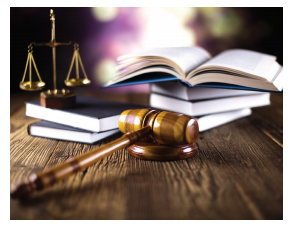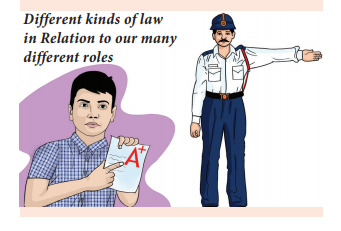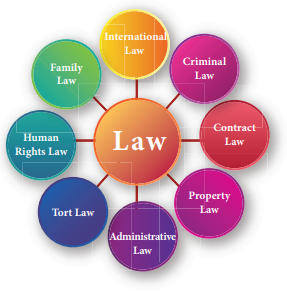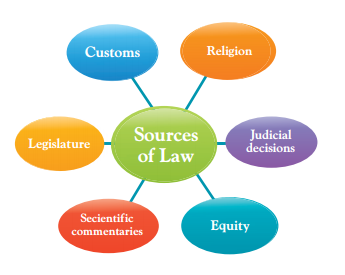Meaning, classification, sources - Law | 11th Political Science : Chapter 4 : Basic Concepts of Political Science Part II
Chapter: 11th Political Science : Chapter 4 : Basic Concepts of Political Science Part II
Law
LAW
Introduction
Law is the prescription of rules
and regulations sanctioned by the sovereignty for the state. Law as, Bodin
said, is the command of the
sovereign. Similarly Aristotle
has rightly pointed out that if there is no law even man will behave like a
beast. In order to preserve society and protect the progressive nation, law has
become an integral part of the system world
over. The enormous
power of law could not be a
complete solution to maintain an order in the society due to the limitations it
is framed with. Law is a tyrant for criminal and a guardian for its citizen.
There is always an intense debate
that happens on, why the law is lenient in some part of the world and so
powerful in another part of the world. The question of leniency and powerful
the law is, ascertained by its functions
especially the punishment
it involves. For example, law in a democratic country is much different
and concerned than the law in a totalitarian state. And more, how the law
unfurls freedom for its citizens matters a lot while executing and exercising
it. Ignorance of law is not an excuse anywhere in the world. Hence it is
pertinent to introduce the concept of law to the young minds to understand it
as the basic rules and regulations as sanctioned by our constitution.

Learning Objectives
·
Understanding the essence oflaw brings students
closer to the
·
thoughts of
Justice.
·
Classification of law helps students to know the
different kinds of law
and its application
and its implication to our
society
·
Sources
of law gives students a broad understanding on the origin of law
·
The interconnection between State, Law and Morality are highlighted for enabling students to
understand how well they are connected to society through the law of the State.
Introduction
What is Law?
·
A body of rule which is
enforceable by the State.
Law in relation to justice
·
the aim is to attain justice in
society.
·
Justice? It is an abstract idea
of right and wrong, fairness and equality.
·
therefore, the doing of what is
right or just in a particular of circumstances.
Meaning Of Law
The term ‘Law’ was derived from
an old Teutonic root ‘lag’ “which means something which lies fixed or evenly.
Without law life may witness utter chaos and confusion and in fact it is law
that regulates life. The word law is used to denote ‘uniform’. There are two kinds
of laws. They are: physical and human law. Physical law regulates nature where
as human law regulates human life. The term law in political science is used to
mean body of rules to guide human action. The function of state is done through
government and the government in turn interprets the will of the state through
law.
Views On Law
·
“Law is the command of the
sovereign” according to John Austin
·
“Law is the collection of rules
which the state recognizes and applies in the administration of Justice” said Salmond
·
According to krabbe “Law is the
expression of the judgments of value which we human beings make by virtue of
our disposition and nature”
·
“Law is that portion of the
established thought and habit which has gained distinct and formal recognition
in the shape of uniform rules backed by the authority and power of the
government.” Said Woodrow Wilson
·
“A law is of general rule of
external human action enforced by a sovereign political authority.” Said Holland
What is the purpose of Law?
According to Maclver “A law does not
become a law until and unless it is backed by the state. The purpose of law is
to establish sure foundations in the certitude of which men can rebuild the
many mansions of society.” The term ‘Law’ is considered as a body of rules to
govern human action and as well to regulate human life by the discipline
Political Science. ‘It is not the issuing of law that makes the state, it is
the force of the state that makes law” believe Hocking.
What are the purposes of Law?
v Protect
basic human rights
v Promote
fairness
v Help
resolve conflicts
v Promote
justice
v Promote
order and stability
v Promote
desirable social and economic behaviour
v Represent
the will of the majority (on some issues)
v Protecting
the rights of minorities
Are you aware of the classification of Laws?
i. Private laws
The relationship of citizens and the regulation of
relations among one another are determined by private laws.
i.
Public laws
The laws that determine the relation of citizens to
the state are public laws. Public law perceives state as an arbiter as well as
one of the parties interested in it.

ii.
Constitutional laws
The common law differs from statutory law because
it is mainly based on precedent. Statutory law is a more formal body of the
legal system that consists of written legislation. This legislation will mainly
be based on rules and regulations either mandating or prohibiting certain
behaviors of the general public. Common law, on the other hand, will allow
judges to decide cases based on the rulings of prior cases with similar
circumstances.
Constitutional laws are the basic laws according to
which the government in a state conducts itself. The laws that define interpret
and regulate the functions of the government are known as constituteional laws.
For example, the election of President, the powers and functions of the Supreme
court and method of the appointment of the governor are constitutional affairs.
The laws which are not related to the forms and functions of the government and
to the fundamental rights but are related to the social and economic affairs of
all citizens are known as ordinary laws. For example, the abolition of child
marriage and prohibition etc come under ordinary laws.
iii.
Statute Laws
Statute laws are the laws which are framed by the Legislative
Assembly or by the Parliament. Democratic Government being popular in most of
the countries, the laws of those government are framed mostly by the
Parliaments in those countries.
v. Ordinances
Ordinances are generally issued by the executive
branch of the government as per the law of the state. Ordinances are temporary
by nature and are issued by the President in the absence of parliament,
especially to face the emergency.
vi. Common Laws
Common laws are those laws which rest on customs
but are enforced by the courts like statute law. Common laws are popular in
England.
vii. Administrative Laws
The office and responsibilities of government
servants are interpreted and governed by Administrative law. It is the
Administrative law that enable the public officers to separate law and
procedure from private individuals. These laws also make an attempt to
interpret the privileges of government officials. Administrative laws are not
popular in England, U.S.A. and India. They are popular in France and a few
countries of Europe. For example, When any dispute arises between a citizen and
government servant the administrative court resolves the issue with
administrative laws.

viii. International Laws
The rule that determine the conduct of the
civilized states in their relation with other states in international arena is
otherwise called International law. There are no such framed laws that govern
international relations but backed by public opinion and the rule of UNO as an
international body matters for any nation to enjoy its sovereign status. There
are also laws such as Sea law, where there are International borders and as
well Air law that demands aircraft of other nation to fly with permission of
respective nations.
Do you want to know the sources of Law?

i. Customs
Customs play an important role in the framing of the laws. Most of the laws that came from customs are recognized by state later. Since ancient period we can notice that the dispute among tribals were resolved by the head of the Tribes using their customs and traditions. Customs became laws when tribes extended into the formation of state. State cannot actually ignore the customs of the country. The common law of England for example sprang mainly from customs.
For example Bull-Taming sport culture of Tamils of
India resulted into the creation of Jallikattu Law in 2017. (Read the box for
more information about Jallikattu Law of 2017)
ALANGANALLUR – THE BULL – TAMING SPORT
The picture is a bull taming sports of Tamil
culture, popularly called as ‘jallikattu’ at Alangannallur in Madurai district.
Alagannallur is synonymous with the bull- taming sport, usually conducted in
the month of January, along with Pongal festival in Tamil Nadu. Every society
in our country is having its own right to life, liberty and continuing their
culture and tradition but in this case of jallikatu there is a tussle between
cultural rights and animal rights.

As per the constitution of India Art 29(1) is a
fundamental right guaranteed under part III which protects the educational and
cultural rights.
The 2014 judgement of the supreme court asserts
that animals as sentient beings have the fundamental right to life under Art 21
of the constitution.
These contradictions have made several
interpretations in formalizing this sport.
ii. Religion
The religion practiced by Primitive communities
played a decisive role in evolving the laws of the state later. Religion was a
basis of law for most of the nation. The origin of Hindu law can be traced in
the code of Manu. The origin of Mohammedian law can be traced in Shariat law.
Divine law is a law revealed through man from God. God is the ultimate source
of divine law. For Christians Ten Commandments were the first law given by the
Lord Almighty to his people and was considered as the basis of law.
“Indeed the early law of Rome was little more than
a body of technical religious rules, a system of means for obtaining religious
rights through the proper carrying out of certain religious formulas”. -Woodrow Wilson
iii. Judicial decisions
Gettell maintains
that the ‘state arose not as the
creator of law but as the interpreter and enforcer of custom’. The function of
the Judiciary is to interpret and declare the law. While discharging its
function the judiciary creates new laws. The laws later gets recognized by the
state. Judicial decisions thus became an another source of law. Some time the
verdict of High Court and Supreme Court are treated as laws.
iv. Equity
When laws are ambiguous and do not fit in, the
principles of equity are applied and cases are decided according to commonsense
and fairness.
“Equity is a body of rules existing by the side of
the original civil law, founded on distinct principles and claiming
incidentally to supersede the civil law in virtue of a superior sanctity
inherent in those principles.” - Sir Henry
Maine
Equity
v The name
given “Equity” is the set of legal principles in countries following the
English common law tradition, which supplement strict rules of law where their
application would operate harshly, so as to achieve what is sometimes referred
to as “natural justice”
v It also
means “fairness”
v Equity
has been described as “a gloss (meaning a supplement) on the common law, filling
in the graps and making the English legal system more complete
v In
English Law, equity means that body of rules originally enforced only by the
court of chancery.
v. Scientific
commentaries
Another source of law are scientific commentaries.
when the commentary appears it is understood only as an argument, later on its
authority is recognized as more authoritative than the Judicial decision.
“The opinion of learned writers on law have often
been accepted as correct law: in England , for instance the opinions of Coke
and Blackstone in America of story and kent , in India of Vijnaneswara and
Apararka” - A.
Appadurai
vi. Legislature
Most of the laws in the modern times are framed by
legislature and it is one of the most important source of law. Indian constitution
is a classical example where the best provisions of other constitutions are
borrowed and made it available for the best of our nation
“The state is founded on the minds of its citizens,
who are moral agents.. a bad people means a bad state and a bad laws.” - Gilchrist
Sources Of The Indian Constitution
Government of India Act 1935: The federal scheme. Office of the Governor. Role of federal
judiciary. Emergency provisions
UK Constitution: Law making
procedures, Parliamentary Government, Rule of Law, Single citizenship and
Bicameral Legislature.
US Constitution*: Fundamental Rights, Independent judiciary, Judicial Review, Impeachment of the
President, Procedure for the removal of the judges of the Supreme Court, High
Courts and Role of Vice President.
How law is related to state and morality?
Law and morality are complimentary to each other.
Ethics reveals its citizens the code of conduct. Similarly the laws framed by
state also aim to achieve the same goal. The sole aim of the state lies in the
promotion of the welfare of the people. As there is a close affinity between
law and morality, there also exist a good relationship between law and state.
“The best state is that which is nearest in virtue
to the individual. If any part of the body politic -suffers, the whole body
suffers”. -Plato
A bad state will have bad citizens and a good state
will have good citizens. So it is the sole function of the state to keep a good
standard of morality. Government of India is trying its best to eliminate the evil
of untouchability. It has framed laws against untouchability. Though there is
law against social ills it is understood that it is rather a sin to adopt the
policy of discrimination on the grounds of caste and creed, colour and race,
clans and tribes, groups and classes. The government is taking measures to
prohibit the drinking of wine and also prohibits child marriages. Generally
democracy does not have any such law as opposed to morality. Wilson maintains that the aim of the
law of a state is to develop morality in the state. Hence the sovereign
law-making authority pays due attention to the code of the intimacy between law
and morality.
‘‘We regard the state as the condition or morality.
The state and law continually affect both public opinion and actions; in its
turn law reflects public opinion and thus acts as the index or moral progress” - Maclver
Distinction between Law and Morality:
v Laws are
enforced by the state, if not obeyed to the commands of law, he is likely to be
punished by the state.
v The
severe punishment one can be awarded to a person for not observing the scruples
of morality is the social boycott.
v Morality
is concerned with both internal and external affairs of man whereas law is
concerned only with the external affairs of man. Hence, law punishes only those
persons who violate laws by their external actions.
v Law
punishes a person only when he commits a theft or dacoity or murder or any
other physical crime.
v Law
cannot punish a person for telling a lie or for abusing some one.
v Telling
lies, condemning someone and being ungrateful and many other actions of man are
sins but they are not crimes. Machiavelli maintained that even the immoral
practices are legal, if they are applied for the benefit of the state.
Public Opinion: Opinion held by people for the common welfare
What is Moral law?
A law framed with a purpose of
eliminating evils such as drinking of wine, gambling, theft, dacoity and murder
are moral laws. The laws which are based on morality remain permanent
How Law and Public opinion are related to each other?
The power of democracy lies in
the participation of people in the democratic exercise of electing their
representatives. People are not directly involved in the framing of laws, yet
they could elect their representatives to legislature. People elect their
representatives to execute the will of the electorate. The elected body are
just expected to represent the will of the public. Here we can understand the
close affinity of law and public opinion.
The Modern state appeals to
morality, to religion, and to natural law as the ideological foundation of its
existence. At the same time it is prepared to infringe any or all of these in
the interest of self-preservation. J.M. Coetzee
In democracy laws are framed only
based on the support of public opinion. People carry out peaceful
demonstrations to express their opinion or resentment.
Common welfare of the people and
social progress are the primary considerations of public opinion.
Related Topics